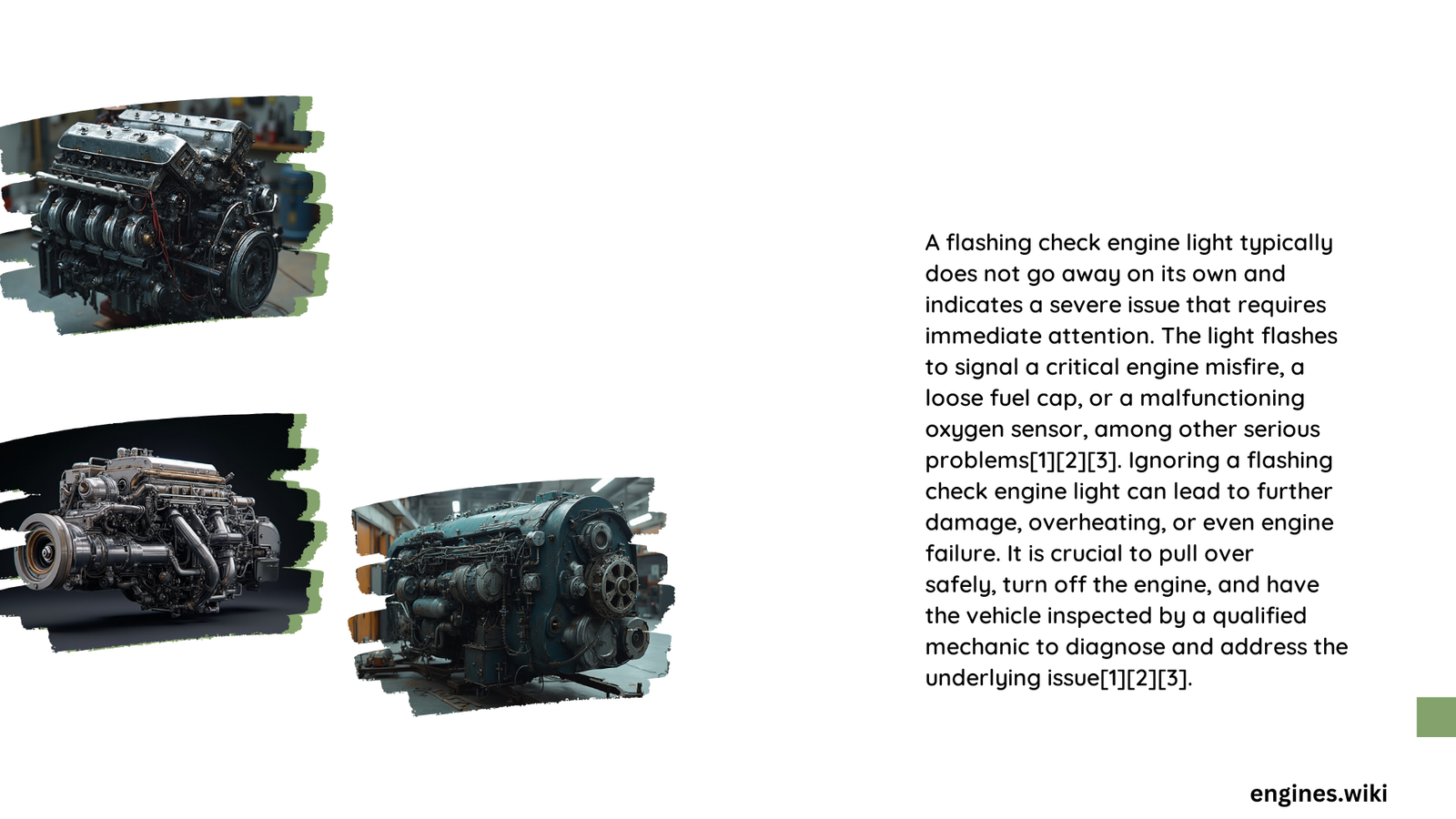A flashing check engine light is a serious warning that requires immediate attention. It indicates a severe engine problem, typically a misfire that can quickly damage the catalytic converter. Unlike a steady check engine light, a flashing one will not go away on its own and demands prompt action to prevent costly repairs. This article explores the causes, implications, and necessary steps when faced with this critical vehicle warning.
What Causes a Flashing Check Engine Light?
A flashing check engine light is triggered by the vehicle’s onboard diagnostic system when it detects a severe engine problem. The most common causes include:
- Engine misfires
- Ignition system failures
- Fuel system issues
- Catalytic converter problems
These issues can lead to significant engine damage if not addressed promptly. Unlike minor problems that may cause a steady check engine light, the conditions triggering a flashing light are severe enough that the light will continue to flash until the underlying issue is resolved.
Will the Flashing Check Engine Light Resolve Itself?

The short answer is no. A flashing check engine light will not go away on its own. Here’s why:
- Severity of the Issue: The flashing light indicates a critical problem that requires immediate attention.
- Continuous Detection: The vehicle’s computer continuously detects the severe issue, keeping the light flashing.
- Potential for Damage: Ignoring the warning can lead to catastrophic engine failure or expensive catalytic converter damage.
What Are the Specific Conditions That Might Cause a Flashing Check Engine Light?
Several specific conditions can trigger a flashing check engine light:
- Severe Engine Misfire: When one or more cylinders fail to fire properly, causing unburned fuel to enter the exhaust system.
- Faulty Spark Plugs or Ignition Coils: These can cause misfires and trigger the flashing light.
- Fuel System Malfunctions: Issues with fuel injectors or fuel pressure can lead to severe misfires.
- Timing Chain or Belt Problems: If these components fail, it can cause the engine to run erratically.
- Vacuum Leaks: Severe vacuum leaks can disrupt the air-fuel mixture, leading to misfires.
What Are the Most Common Issues and Their Associated Repair Costs?
Here’s a breakdown of common issues and their estimated repair costs:
| Issue | Estimated Repair Cost |
|---|---|
| Spark Plug Replacement | $100 – $250 |
| Ignition Coil Replacement | $150 – $400 |
| Fuel Injector Cleaning/Replacement | $200 – $1500 |
| Catalytic Converter Replacement | $1000 – $2500 |
| Timing Chain/Belt Replacement | $500 – $2000 |
These costs can vary depending on the vehicle make, model, and location.
How to Reset the Check Engine Light?
While it’s possible to reset the check engine light, it’s crucial to understand that this should only be done after addressing the underlying issue. Here’s the general procedure:
- Connect an OBD-II scanner to the vehicle’s diagnostic port.
- Turn the ignition on (don’t start the engine).
- Use the scanner to retrieve and clear the diagnostic trouble codes (DTCs).
- Turn off the ignition and disconnect the scanner.
- Start the engine to ensure the light doesn’t come back on.
Warning: Resetting the light without fixing the problem can lead to more severe damage and potentially dangerous driving conditions.
When Should Vehicle Owners Seek Professional Help?
Immediate professional help is necessary when:
- The check engine light is flashing
- You notice unusual engine sounds or vibrations
- There’s a loss of power or jerky acceleration
- You smell unusual odors, especially gasoline
It’s crucial to have the vehicle towed to a mechanic rather than driving it to prevent further damage.
What Temporary Solutions Can Mitigate Risks Before Visiting a Mechanic?
While it’s best to avoid driving with a flashing check engine light, if you must move the vehicle:
- Reduce speed and avoid rapid acceleration or deceleration.
- Minimize the distance driven.
- Turn off non-essential electrical systems to reduce load on the engine.
- If possible, have the vehicle towed to the nearest mechanic.
Remember, these are temporary measures and do not replace the need for professional diagnosis and repair.
In conclusion, a flashing check engine light is a critical warning that will not resolve on its own. It requires immediate attention to prevent potentially severe and costly damage to your vehicle. Always prioritize safety and seek professional help when faced with this serious automotive issue.
References:
1. AutoZone: What Does a Flashing Check Engine Light Mean?
2. Fred’s Auto Repair: What to do When Your Check Engine Light Is Blinking?
3. Westside Car Care: Here’s What to Do When Your Check Engine Light Starts Flashing
